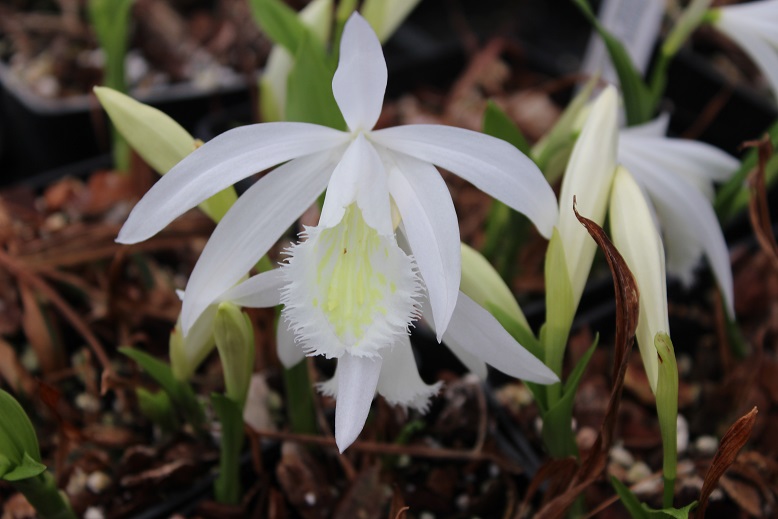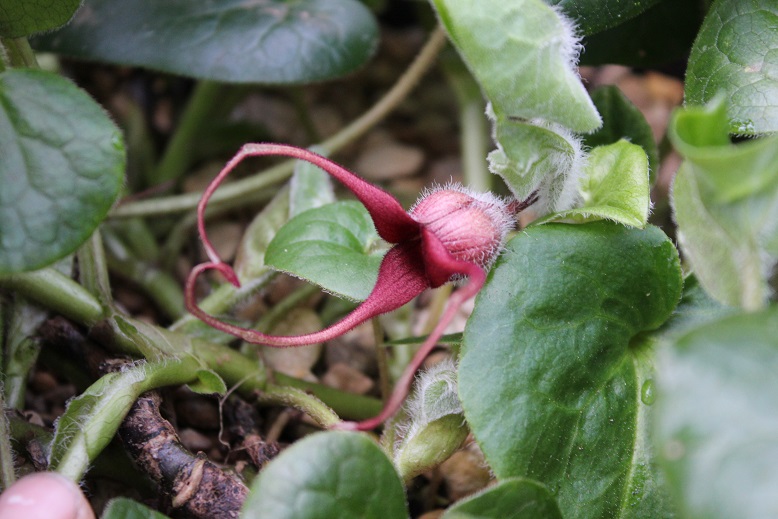JEARRARD'S HERBAL

3rd April 2016
Erythronium revolutum 'Knightshayes Pink' .
A week of ups and downs has culminated in a sunny afternoon just when one was needed. A light drizzle yesterday morning damped things down at the start of the day but cleared away
before it became unwelcome. I walked around the garden taking pictures, and for the first time in months I didn't have wet knees when I finished. It's a small thing, but it felt
like some sort of victory.
The Erythronium all seem to have appreciated the wet winter, the leafy clumps are bigger and lusher than ever before. There is a mass of pale cream flowers on 'Margaret Mathew'
but somehow a few blooms on 'Knightshayes Pink' are more appealing. There are lots of pale hybrids appearing on the market and they are all wonderful, but there is something about
the pink ones that draws me to them. For the last two years I have collected the seed from the E. revolutum forms. Half of it was sown in large pots and half of it strewn
willy-nilly along the border. I haven't seen anything coming up yet under the trees, but in pots I have a little forest of broad leaves, promise for the future.
I found a picture of my Fuchsia collection from 40 years ago. All the pots standing in ordered rows, crisp white labels in standard positions at the back. It was quite frightening
to see the obsession laid out so starkly. I find it very comforting that the willy-nilly Erythronium haven't germinated.

3rd April 2016
Narcissus moschatus .
There are a few really beautiful daffodils that seem to stand apart from their bretheren. I'm not sure what it is about N. moschatus that distinguishes it in a host of pale daffs.
Perhaps it is the nodding flower nestled amoung the glaucous leaves. Whatever it is, N. moschatus manages to look fabulous in the border at the moment. My single bulb of last year
has divided into two and in a garden that is becoming increasingly colourful as the season advances, they are the first thing to catch the eye.
I visited Cornwall Garden Society's show yesterday and the daffodil classes are very enlightening. Rows of yellow flowers in straight lines, I would have thought they would all fade into
a jaundiced blur but in fact some stand out. From time to time a single bloom transcends the line to show that some daffodils are more equal than others. I have a small collection
and I am trying to restrict myself to those that stand apart. Yesterday I came home with a pot of 'Blushing Lady'. I had never seen it before and I had to have it. Clearly one of those that are special.
Unfortunately my determination to be selective took a blow at the same time. In a 2-for-1 offer I came home with a pot of 'Pencrebar' as well. Lovely as it is, I wouldn't have
bought it. If I'm strong I will manage to give it away in the week, but it is harder to let go than not to have.

3rd April 2016
Pleione formosana 'Snow Bunting' .
The pure white flowered forms of P. formosana are all very similar. 'Snowbunting' was bred from the almost identical 'Clare' and both are vigorous. I have them in flower at the moment,
from the same unimpeachable source and I can only distinguish them by the very fine pencilling. HB pencilling in this case, and it's on the label. There are a number of other named clones available,
some originally collected from the wild. It is possible that they differ in vigour slightly but it is difficult to tell if it is the plants that vary or the growing conditions.
All of which tends to throw an oily spanner among the blooms. It is a pity, they are all exquisite in flower and easy to grow. Perhaps the variety of names is most useful in reminding us of the
history of the different clones.
'Snow White' is probably one of the original clones collected in Taiwan by the Japanese botanist Fukuyama Noriaki on Mt. Hsiakalo in Hsinchu, Northern Taiwan during the 1930's. He
named them var. nivea, a name that has not survived.
I can't currently find who named it 'Snow White'.
Paul Christian thinks that 'Clare' originated with Simmons orchid nursery in London, and almost certainly came from a wild collection.
Ian Butterfield crossed these two forms and selected 'Snow Bunting' from the seedlings.
This is the situation to the best of my current knowledege. We live in an age where all published information will eventually become available and the facts will become untangled. The plants on the other hand -
just don't mix the labels!

3rd April 2016
Asarum caudatum .
The red flowers of Asarum caudatum put me in mind of the destruction caused by rabbits. Caudatum referring to the long tails on the open flower. I have had an attack of rabbits during the week.
An attack of Easter Bunnies to be exact. The sort of little bunny that finds itself with a too much time on its hands during the Easter holiday. While I was away one day a group of little rabbits
visited my Agave house, tore out a little grove of Cycads and trashed a few other things. It is a bit frustrating, I lost a seedling Agave albopilosa that was the pride of its pot. A large
Yucca aloifolia 'Purpurea' has wandered off in the company of Agave victoria-reginae that was just becoming a fat globe. That one will have fought back. Somewhere there is a little bunny with
inadequate parental supervision who spent an evening licking his wounds!
What are little boys made of? Frogs and snails and puppy dogs tails, that's what little boys are made of.
So I spent a moment grieving over the damage. I felt quite guilty at the speed with which it became relief at the space I now have to plant things out.
I probably did worse things when I was a little bunny.
By the time I caught myself singing half remembered nursery rhymes at a red flowered Asarum I realised it was time to get over it. A week of ups and downs.




